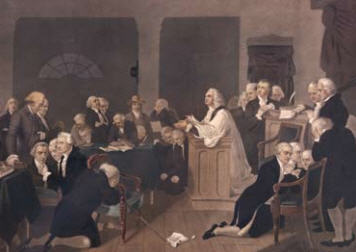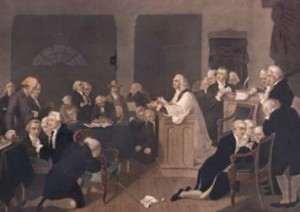Arkansas A.G. Stands Up for Religious Liberty
 We have written repeatedly about states around the country trying to force bakers, photographers, florists, and others to participate in same-sex ceremonies despite these individuals’ religious convictions about marriage.
We have written repeatedly about states around the country trying to force bakers, photographers, florists, and others to participate in same-sex ceremonies despite these individuals’ religious convictions about marriage.
In many cases, states are alleging that declining to participate in a same-sex wedding runs afoul of the state’s civil or criminal anti-discrimination laws. One of the more high-profile cases involves Arlene’s Flowers in Washington State.
Yesterday Arkansas Attorney General Leslie Rutledge announced she was co-filing an amicus brief in support of Arlene’s Flowers. Below is a press release from her office.
LITTLE ROCK – Arkansas Attorney General Leslie Rutledge is leading a 13-state coalition in filing an amicus brief in the Supreme Court of the State of Washington, urging the court to protect the religious conscience rights of its citizens. The attorneys general believe this case has national implications and that similar cases may arise in their states.
“This country has a rich history of protecting the rights of conscience and the free exercise of religion,” said Attorney General Rutledge. “Unfortunately, these rights have recently come under a sustained and coordinated assault even though they are the very reason many came to this country in the first place. Along with my colleagues, I am urging the Washington Supreme Court to recognize that the actions of the defendant are not discriminatory or unlawful but rather reflect sincerely held religious beliefs that should be accommodated in our pluralistic and tolerant society.”
The case involves an owner of a flower shop (Ms. Barronelle Stutzman) who declined to create a floral arrangement for and oversee its placement at a same-sex wedding based on her religious beliefs. She is being sued by the State of Washington under its discrimination law and unfair business practices act.
Stutzman has served this particular client for years, considered him a friend and remains willing to serve him in the future, but she simply believes based on her religious beliefs that she could not participate in and create a flower arrangement for the same-sex marriage.
The attorneys general conclude in their brief that “Our history encourages a public square with many voices, all trying to persuade others of their views. But Respondents want all the voices either to agree on one view or to be silent. Because that runs counter to America’s history of free speech and religious exemptions — which are embedded in Washington’s Constitution — Amici respectfully urge this Court to rule in Appellants’ favor.”
Arkansas is joined in filing by attorneys general from Alabama, Arizona, Louisiana, Nebraska, Nevada, Oklahoma, South Carolina, Texas, Utah and West Virginia and the governors of Kansas and Kentucky.
We applaud Attorney General Rutledge and her office for taking a stand for religious liberty and rights of conscience.



 Last week the Fourth Circuit Court of Appeals overturned a lower court decision against ceremonial prayers at government meetings.
Last week the Fourth Circuit Court of Appeals overturned a lower court decision against ceremonial prayers at government meetings.
 As we have written before
As we have written before